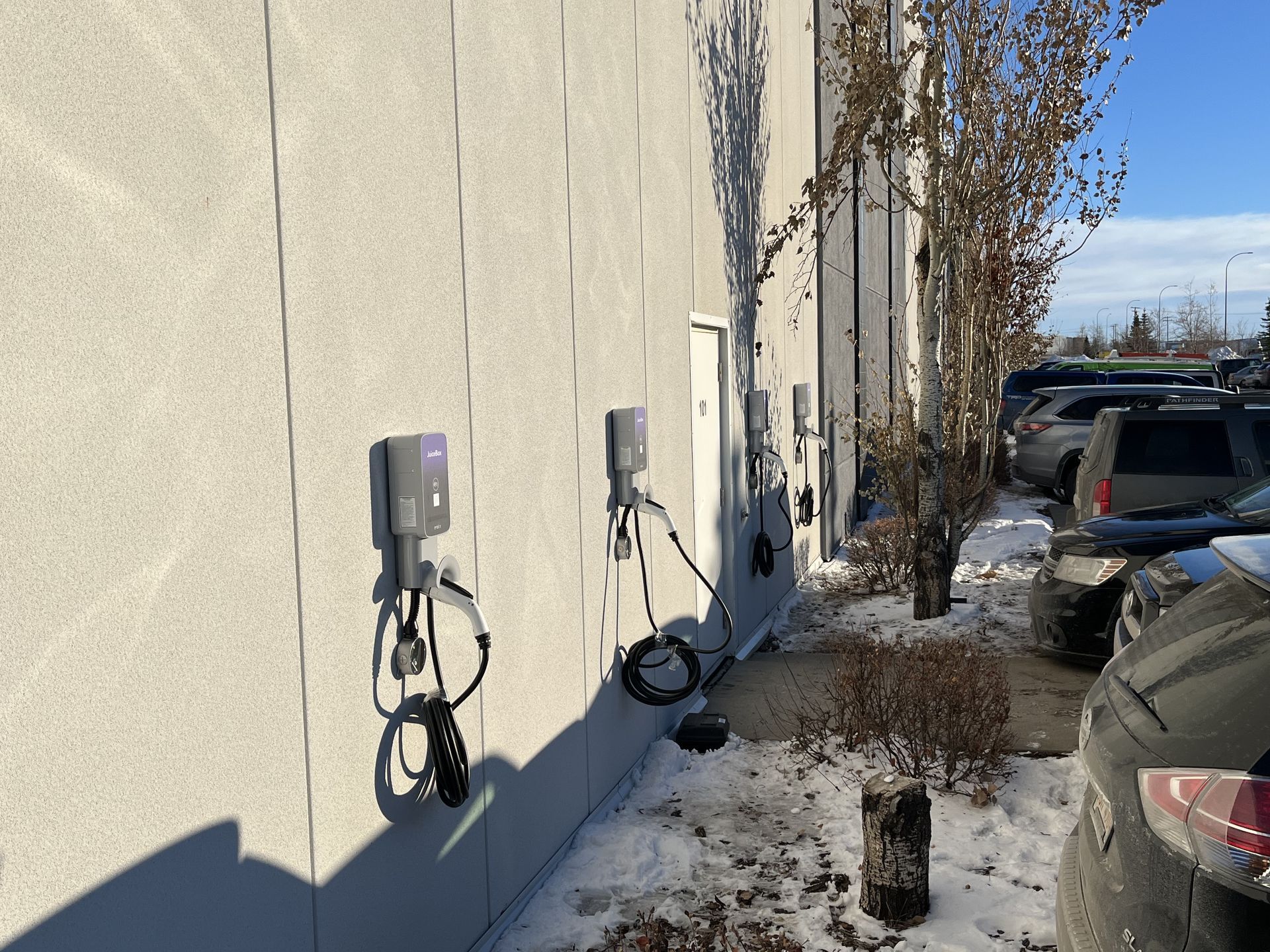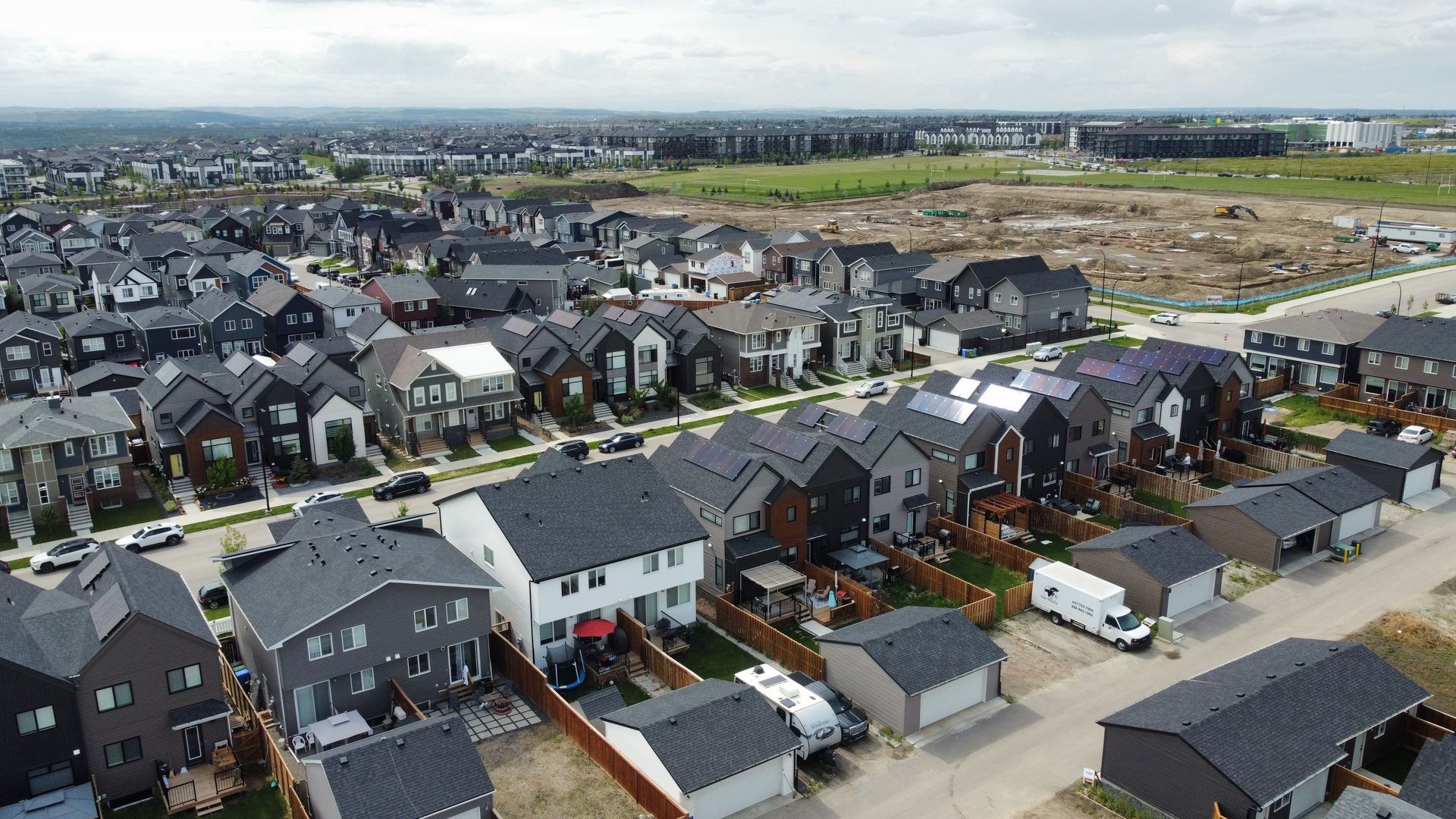How Much Does it Cost to Install an EV Charger at Home?
Electric vehicles have revolutionized the way we think about transportation, offering a greener and more sustainable future. As more people in Alberta purchase electric cars, the demand for home EV chargers has skyrocketed. However, one question that often comes up is the cost of installing an EV charger at home. All things considered, the average cost to professionally install an electric vehicle charger will range from $500-$2,500 for most common cases.
The cost of installing an EV charger can vary depending on several factors including;
- The type of home charger (Level 1 or Level 2).
- The amperage of the home charger (16-80A).
- The home layout between the electrical panel and the proposed charging location.
- The electrical panel age and availability of breakers.
- The service size of the home (100A, 150A, or 200A+).
- Pre-existing electrical deficiencies which may require correction.
- If the load calculation requires energy management (EVEMS).
- Garage location: attached or detached.
It can be difficult for home owners to estimate the cost of installing an electric vehicle charger because many of the factors impacting the cost are difficult to assess for those not familiar with performing electrical upgrades. If you're wondering how much your installation could cost - reach out to Evalence for a free EV Charger Installation Quote. In 2023, Evalence installed 100+ level 2 chargers - we can get you charging too!
Understanding the Basics of Home EV Charger Installation
Introduction to Home EV Charging
Your home is the most convenient location to charge your electric vehicle. Installing a charging station in your garage, means that you can start every day with a full battery! Typically your EV will come with a portable charger which can be plugged into a household outlet. This is considered a level 1 charger, and will usually only trickle charge the battery by adding 4-8km/hr of range. While this may be a good solution for hybrid electric vehicles, this usually does not provide enough charge speed for full electric vehicles (especially in the winter).
Level 2 chargers operate on a 240 Volt, 10-80A circuit! This is significantly more power than a typical household outlet, and is comparable to what a hot tub, wall oven, or dryer would be powered with. The most common charger size we install is a 40A charger, installed on a 50A, Nema 14-50 dedicated circuit. Additionally, 48A wall chargers are also commonly installed on a 60A circuit.
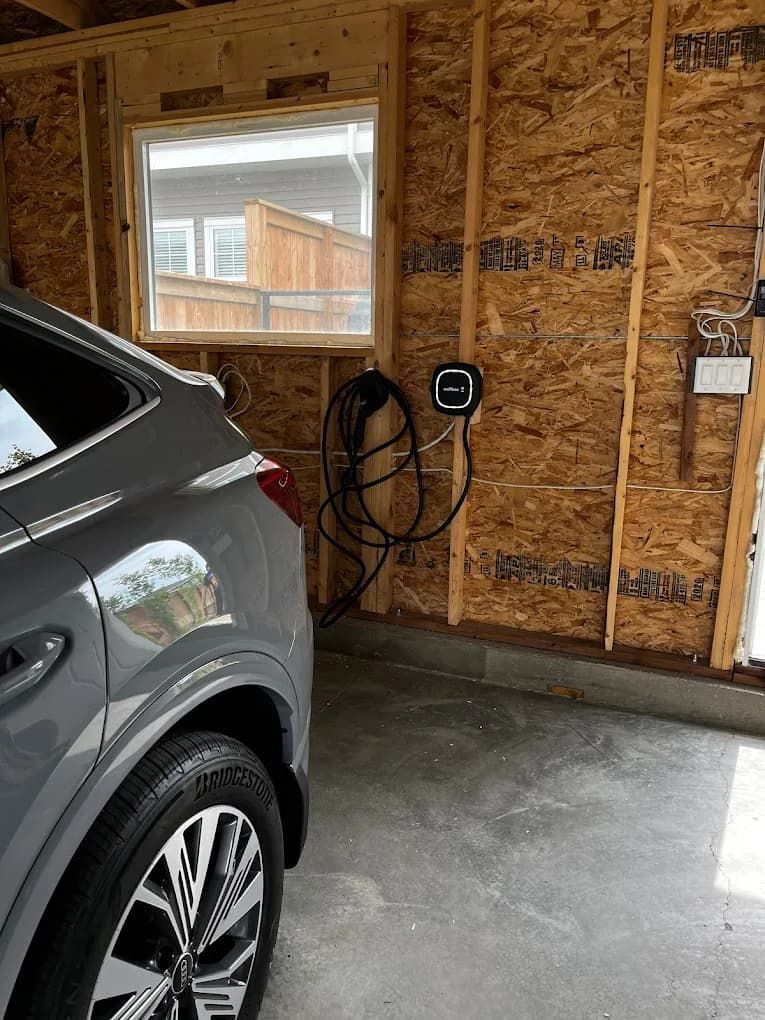
Wallbox charger installed beside an Audi Q4
Types of Home EV Chargers
Electric vehicle chargers can be sorted into three categories; level 1 (120V), level 2 (240V), and level 3 (DC Fast Chargers). This article will focus on level 2 charging, because this is the most applicable type of charger for residential use. Although their are many brands of EV chargers (Tesla, Wallbox, Siemens, ABB, Autel, Flo, Chargepoint, Grizzl-E), they are generally installed to similar specifications and will work in the same way. All of these brands should be installed by a licensed electricians - like Evalence Renewables!
The Major Factors Influencing Installation Costs
Charger Location
The charger location relative to your home electrical panel will have a major impact on the cost of installation. Longer runs of electrical wire and conduit will increase the cost of materials and labor. 6 or 8 gauge copper wire is utilized to install level 2 chargers, and this is typically billed to customers by the meter. Reducing the length of wiring required for the charger is a great opportunity to reduce your installation cost. For example, installing your charger on the wall of the garage closest to the electrical panel will reduce installation costs.
Another consideration are the obstacles between your electrical panel and your charger location. Finished basements, concrete walls, and detached garages can present more challenges and increase the cost of your installation.
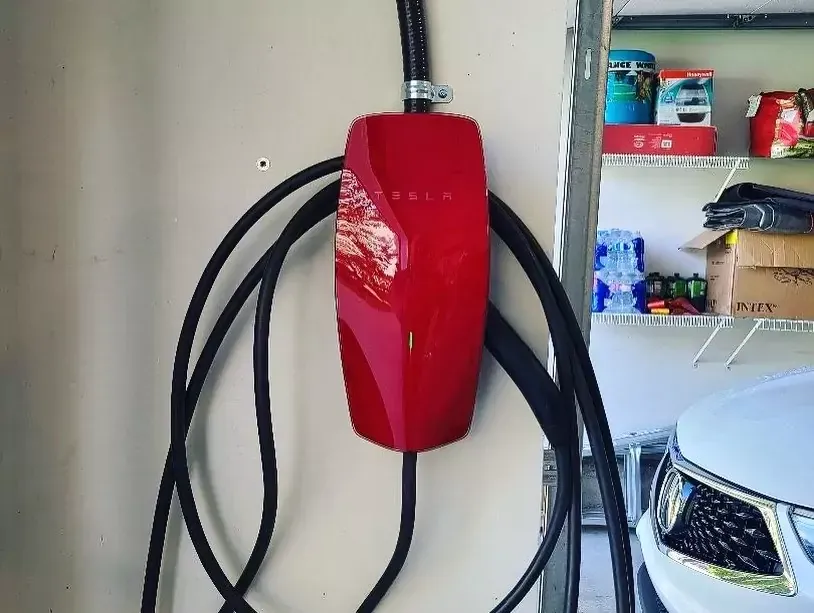
Tesla Wall Connector Installed in an attached garage.
Home Electrical Upgrades
Homeowners may need to consider performing electrical upgrades prior to installing a home ev charger. In Alberta, the majority of homes have a 100A electrical service size. This is the amount of amperage the home is capable of using at any given time. This service may be acceptable for regular home use of ovens, heaters, ac units, and lighting - but can be considerably strained when electric vehicle charging is introduced. Cities of Edmonton, Calgary, and other Alberta municipalities have mandated electrical load calculation prior to installing home chargers. If the charger will not "fit" into the home load calculation the following options are available:
Electric Vehicle Energy Management Systems (EVEMS)
EVEMS is a device that monitors the electric vehicle charging load, and will turn off the circuit if the overall home load limit is reached. Their are several EVEMs options which can be utilized including the DCC-12, SimpleSwitch, and Wallbox Power Meter to name a few. These devices will typically add between $750-$1,250 of cost to an EV charger installation, but may be required to permit the installation.
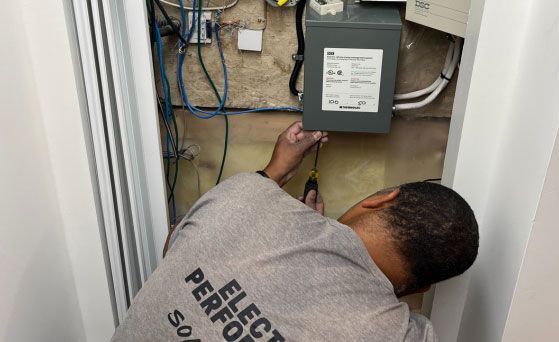
Evalence installing a DCC-12 EVEMS unit.
Electric Vehicle Energy Management Systems (EVEMS)
Upgrading your home service size has a high upfront cost, but can be beneficial for modernizing your home to allow for ev charging. It's a more expensive option, but generally allows the home owner the most flexibility to add additional electrical loads in the future. The total cost to complete a service size upgrade can range from $2,000 - $10,000 depending on the extent of the work required. Sometimes it can be as simple as swapping in a new electrical panel, and other times it can require trenching and installation of a larger diameter wire to the house. Service size upgrades are always coordinated with the wire provider (Enmax, Fortis, or Epcor) in Alberta. Sometimes a service upgrade can be recommended for other reasons including; installlation of grid-connected solar panels, or the development of a basement suite.
Estimating Installation Expenses for Home EV Chargers
Breakdown of Installation Costs
Installation costs will typically include the following items:
- Electrical Permit ($125-$200)
- Installation Labor ($200-$800)
- Double Pole 50A Breaker ($50-$200)
- 6 - 8 Gauge Wire ($15-$25/meter)
- Non-itemized Electrical Supplies ($25-$250)
The itemized costs result in a typical price range of $500-$2,500 to install an electric vehicle charger. Other installation costs which can increase the price of the installation are:
- EV Charging Station ($400-$1,800)
- Energy Management Devices ($700-$2,000)
- Custom Finishing (hiding conduit behind finished walls or ceilings) ($200-$1000)
- Sub-Panel Installation ($400-$1,000)
- Trenching for Detached Garages ($500-$2,500)
- Service Size Upgrades ($2,000 - $10,000)
Professional Installation vs. DIY
Professional ev charger installation will typically result in a higher upfront cost, but a higher quality installation. A licensed electrician will ensure that your charger is installed correctly to manufacturer's specifications and in compliance with the Canadian Electric Code. The increased costs for a professional installation typically result from the higher costs of running a licensed business including insurance, permitting, labor, and administrative costs.

Professional charger installation for a Mercedes EQS AMG
Additional Expenses to Consider
Although obvious to some - charging your electric vehicle will use a significant amount of electricity and impact the size of your energy bill. Charging your electric vehicle at home will typically consume between 100-500 kwh of electricity every month. At a rate of $0.10/kwh, this would add between $10-$50 in monthly electricity costs before considering administration and distribution fees.
Home Layouts That Can Make Installing a Home EV Charger More Expensive
Detached Garages
The dreaded detached garage! Unfortunately, electrifying a detached garage is more complicated than a typical attached garage installation. Most garages are powered by a 15A circuit, which does not allow enough amperage to also run an electric vehicle charger. Often, a new electrical line must be ran to the garage which can require trenching. If trenching is required, this can be labor intensive and require additional conduit, wire, and other electrical materials. Trenching will typically raise the installation price by $700-$2,500.
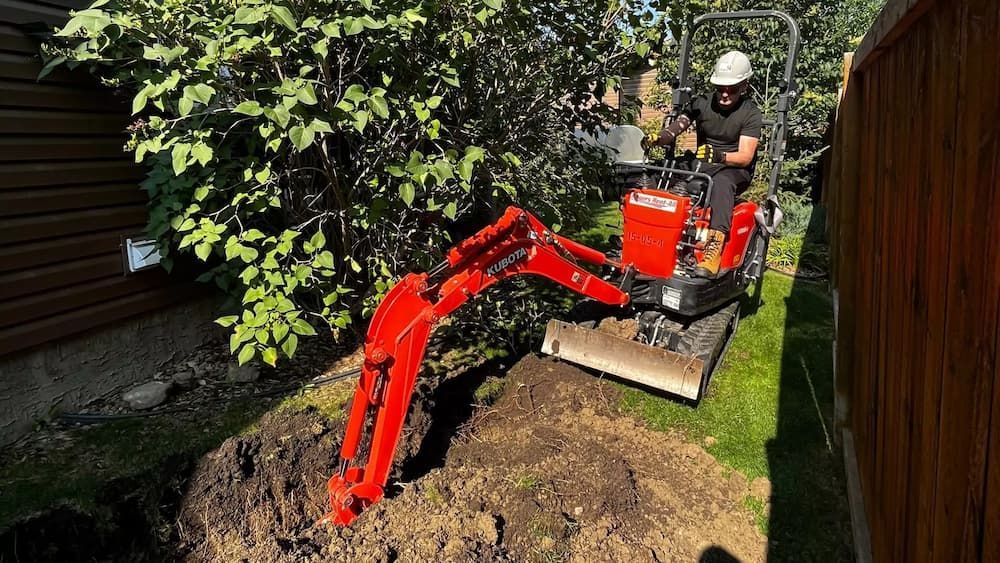
Digging a trench to a detached garage using a mini excavator.
Finished Basements
Finished basements can present a challenge when the electrical panel room is not located near the charging location. A wire has to be fished from the electrical panel, through the basement, and into the garage. When the garage ceiling is finished it can be more difficult to complete the task of fishing. Sometimes it can be done using existing access hatches, but often small holes must be utilized to move the wire through the basement. This can add significant labor cost, and increased finishing costs to patch access holes.
Making Informed Decisions About Home EV Charger Installation
The cost of an EV charger installation can vary significantly based on your unique home layout and installation requirements. If you're curious about the potential cost of your installation, don't hesitate to contact Evalence for a complimentary EV Charger Installation Quote. With over 100 Level 2 chargers installed in 2023, Evalence can assist you in getting your charging setup as well!
Recent Posts
